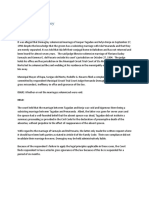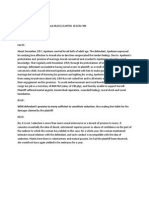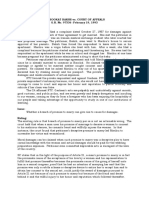Baksh v. CA
Baksh v. CA
Uploaded by
Fayme Gabrielle GapayaoCopyright:
Available Formats
Baksh v. CA
Baksh v. CA
Uploaded by
Fayme Gabrielle GapayaoOriginal Description:
Copyright
Available Formats
Share this document
Did you find this document useful?
Is this content inappropriate?
Copyright:
Available Formats
Baksh v. CA
Baksh v. CA
Uploaded by
Fayme Gabrielle GapayaoCopyright:
Available Formats
Baksh v.
CA (1993)
DOCTRINE:
Although breach of promise per se is not an actionable wrong, if it was done in deceit to lure a woman into sexual
congress with a man who has no intention to fulfill a promise of marriage, then award for damages is justified not
because of the promise but because of the fraud, deceit, and willful injury to her honor and reputation.
FACTS:
Marilou Gonzales filed a complaint dated October 27, 1987 for damages against Gashem Shookat Baksh for the alleged
breach of their agreement to get married. She met the petitioner in Dagupan where the latter was an Iranian medical
exchange student who later courted her and proposed marriage. Baksh even went to Marilou’s house to secure approval of
her parents. The petitioner then forced the respondent to live with him in his apartment. Marilou was a virgin before she
lived with him. After a week, she filed a complaint because Baksh started maltreating and threatening her. He even tied her in
the apartment while he was in school and drugged her. Marilou at one time became pregnant but the petitioner administered
a drug to abort the baby.
Baksh repudiated his marriage agreement with Marilou because he is already married to someone in Bacolod, which
later turned out to be a lie. He claimed that he never proposed marriage or agreed to be married neither sought consent and
approval of Marliou’s parents. He claimed that he asked Marilou to stay out of his apartment since the latter deceived him by
stealing money and his passport. The private respondent prayed for damages and reimbursements of actual expenses.
ISSUE: Whether breach of promise to marry can give rise to cause for damages
HELD: NO.
The existing rule is that breach of promise to marry per se is not an actionable wrong. The court held that when a man uses
his promise of marriage to deceive a woman to consent to his malicious desires, he commits fraud and willfully injures the
woman. In that instance, the court found that petitioner’s deceptive promise to marry led Marilou to surrender her virtue and
womanhood.
Moral damages can be claimed when such promise to marry was a deceptive ploy to have carnal knowledge with the woman
and actual damages should be paid for the wedding preparation expenses.
PETITION DENIED, with costs against Baksh.
You might also like
- Philosophy of Law Syllabus 2019 1st SemDocument1 pagePhilosophy of Law Syllabus 2019 1st SemFayme Gabrielle Gapayao50% (2)
- Domingo vs. CA 226 SCRA 572Document2 pagesDomingo vs. CA 226 SCRA 572RR FNo ratings yet
- Lupo Atienza v. Judge Brilliantes PDFDocument6 pagesLupo Atienza v. Judge Brilliantes PDFchescasenNo ratings yet
- (G.R. No. 211285. June 4, 2014.) Ursula Ocopio Macam, Petitioner, vs. Cesar Macam, Jeremy Macam and REYNALDO MACAM, RespondentsDocument5 pages(G.R. No. 211285. June 4, 2014.) Ursula Ocopio Macam, Petitioner, vs. Cesar Macam, Jeremy Macam and REYNALDO MACAM, RespondentsMitzi Caryl EncarnacionNo ratings yet
- Dacasin Vs DacasinDocument2 pagesDacasin Vs DacasinPam Otic-ReyesNo ratings yet
- 14 California Clothing Vs QuinonesDocument3 pages14 California Clothing Vs QuinonesGabriel DominguezNo ratings yet
- Josefa Ferrer Vs Sps Mauel and Virginia FerrerDocument2 pagesJosefa Ferrer Vs Sps Mauel and Virginia FerrerChino SisonNo ratings yet
- Concepcion vs. CA (GR No. 120706, 31 January 2000)Document6 pagesConcepcion vs. CA (GR No. 120706, 31 January 2000)JMae MagatNo ratings yet
- Jra Phils Vs Internal RevenueDocument6 pagesJra Phils Vs Internal RevenueJohan FranciscoNo ratings yet
- Valdez v. Republic (Presumption of Death)Document1 pageValdez v. Republic (Presumption of Death)Roberts SamNo ratings yet
- Navarro vs. Domagtoy: FactsDocument12 pagesNavarro vs. Domagtoy: FactsPatrice De CastroNo ratings yet
- Republic Vs Manalo GR No. 221029Document3 pagesRepublic Vs Manalo GR No. 221029Jimenez LorenzNo ratings yet
- BAKSH V CADocument1 pageBAKSH V CARywNo ratings yet
- Madridejo v. de LeonDocument4 pagesMadridejo v. de Leondenver41No ratings yet
- Gandionco Vs Penaranda Case DigestDocument5 pagesGandionco Vs Penaranda Case DigestBianca Viel Tombo CaligaganNo ratings yet
- Uy vs. CADocument4 pagesUy vs. CAoscarletharaNo ratings yet
- Alcazar V AlcazarDocument2 pagesAlcazar V AlcazarsabethaNo ratings yet
- Tanjanco V CADocument1 pageTanjanco V CAMay Ann EsolanaNo ratings yet
- Yangco vs. Rhode (G.R. No. L-996)Document7 pagesYangco vs. Rhode (G.R. No. L-996)info.ronspmNo ratings yet
- Case Digest - Roberto G. Famanila v. CADocument2 pagesCase Digest - Roberto G. Famanila v. CAVince AbacanNo ratings yet
- Versoza Vs VersozaDocument3 pagesVersoza Vs VersozaMadasigon Si DongdongNo ratings yet
- People v. Bindoy 56 PHIL 15Document3 pagesPeople v. Bindoy 56 PHIL 15AnonymousNo ratings yet
- Tuason v. Court of Appeals, GR No. 116607, April 10, 1996Document5 pagesTuason v. Court of Appeals, GR No. 116607, April 10, 1996Ashley Kate PatalinjugNo ratings yet
- Aranes v. Occiano, A.M. No. MTJ-02-1390, April 11, 2002 (380 SCRA 402) PDFDocument3 pagesAranes v. Occiano, A.M. No. MTJ-02-1390, April 11, 2002 (380 SCRA 402) PDFLester AgoncilloNo ratings yet
- Pasco v. CFIDocument1 pagePasco v. CFIrionmargateNo ratings yet
- People Vs CrisostomoDocument6 pagesPeople Vs CrisostomoIsidore1 TarolNo ratings yet
- 398 Buado vs. CaDocument1 page398 Buado vs. CaAbegail GaledoNo ratings yet
- Dedel Vs CaDocument2 pagesDedel Vs CaAljay LabugaNo ratings yet
- Anaya Vs Palaroan 36 SCRA 97 - EJANDocument2 pagesAnaya Vs Palaroan 36 SCRA 97 - EJANJohren A. EjanNo ratings yet
- Domingo vs. Court of Appeals, 226 SCRA 572 - SHORTERDocument1 pageDomingo vs. Court of Appeals, 226 SCRA 572 - SHORTERFrancise Mae Montilla MordenoNo ratings yet
- Reflection On The Dissenting Opinion of Justice BrionDocument2 pagesReflection On The Dissenting Opinion of Justice BrionacNo ratings yet
- Persons HW # 6Document19 pagesPersons HW # 6Pouǝllǝ ɐlʎssɐNo ratings yet
- Supreme Court: Malpractice As A Notary. - in 1941 or FiveDocument3 pagesSupreme Court: Malpractice As A Notary. - in 1941 or FiveChristian Robert YalungNo ratings yet
- 11.b. Digest VDda de Jacob Vs CADocument5 pages11.b. Digest VDda de Jacob Vs CAWhoopiJaneMagdozaNo ratings yet
- 16 Mendoza v. RepublicDocument6 pages16 Mendoza v. RepublichdhshNo ratings yet
- Yapyuco vs. Sandiganbayan 674 SCRA 420 June 25, 2012Document46 pagesYapyuco vs. Sandiganbayan 674 SCRA 420 June 25, 2012Harold Q. GardonNo ratings yet
- Jimenez Vs Cañizares J&J TeamDocument2 pagesJimenez Vs Cañizares J&J TeamYodh Jamin OngNo ratings yet
- Manuel Luis C. Gonzales vs. GJH Land, Inc., Gr. No. 202664, November 10, 2015Document50 pagesManuel Luis C. Gonzales vs. GJH Land, Inc., Gr. No. 202664, November 10, 2015Jerry SerapionNo ratings yet
- Gutierrez V GutierrezDocument1 pageGutierrez V GutierrezMyooz MyoozNo ratings yet
- 99 Somosa-Ramos V Vamenta, JR, 46 SCRA 110 (1972)Document3 pages99 Somosa-Ramos V Vamenta, JR, 46 SCRA 110 (1972)jimmyNo ratings yet
- Dy, Jr. v. Court of Appeals, G.R. No. 92989Document8 pagesDy, Jr. v. Court of Appeals, G.R. No. 92989Krister VallenteNo ratings yet
- Decided by Board: Septemixr 12, 1978Document2 pagesDecided by Board: Septemixr 12, 1978Joanna ENo ratings yet
- (Rai Rai) : Tenchavez v. Escano, 15 SCRA 355 (1965)Document2 pages(Rai Rai) : Tenchavez v. Escano, 15 SCRA 355 (1965)lovekimsohyun89No ratings yet
- Antonia Armas y Calisterio vs. Marietta CalisterioDocument1 pageAntonia Armas y Calisterio vs. Marietta CalisterioAllen SoNo ratings yet
- Hiyas Savings and Loan Bank, Inc. vs. Acuña, G.R. NO. 154132, FactsDocument2 pagesHiyas Savings and Loan Bank, Inc. vs. Acuña, G.R. NO. 154132, FactsRR FNo ratings yet
- Cabreza v. CabrezaDocument3 pagesCabreza v. CabrezaJc Isidro100% (1)
- Madridejo v. de LeonDocument2 pagesMadridejo v. de Leoncmv mendozaNo ratings yet
- Adong vs. Cheong 1Document3 pagesAdong vs. Cheong 1bingNo ratings yet
- Azcueta vs. Republic and C.a., G.R. No. 180668, May 26, 2009Document2 pagesAzcueta vs. Republic and C.a., G.R. No. 180668, May 26, 2009Francise Mae Montilla MordenoNo ratings yet
- 204 Moe v. Dinkins SeneresDocument2 pages204 Moe v. Dinkins SeneresChescaSeñeresNo ratings yet
- Republic of The Philippines, Petitioner, vs. Chule Y. LIM, RespondentDocument5 pagesRepublic of The Philippines, Petitioner, vs. Chule Y. LIM, RespondentRogelio Rubellano IIINo ratings yet
- Digest - Cordora Vs ComelecDocument2 pagesDigest - Cordora Vs ComelecUnknown userNo ratings yet
- The Case of Pesca Vs CASE DIGESTDocument2 pagesThe Case of Pesca Vs CASE DIGEST8LYN LAWNo ratings yet
- Garcia Vs RecioDocument1 pageGarcia Vs RecioKing BautistaNo ratings yet
- 1977 Bar Questions and AnswersDocument33 pages1977 Bar Questions and Answersmarie melanie BuenaventuraNo ratings yet
- Crim Law Week 3 CasesDocument13 pagesCrim Law Week 3 CasesSahoooNo ratings yet
- Digest Agapay Vs PalangDocument2 pagesDigest Agapay Vs PalangLorryDelgadoNo ratings yet
- Anaya Vs PalaroanDocument2 pagesAnaya Vs PalaroanLouise Bolivar Dadivas100% (1)
- G.R. No. 137110 August 1, 2000 Vincent Mercado v. Consuelo Tan FactsDocument1 pageG.R. No. 137110 August 1, 2000 Vincent Mercado v. Consuelo Tan FactsMaki CabuenaNo ratings yet
- Gashem Shookat Baksh vs. Court of AppealsDocument1 pageGashem Shookat Baksh vs. Court of AppealsMr Gawis100% (1)
- Gasheem Shookat Baksh Vs CADocument2 pagesGasheem Shookat Baksh Vs CAguianÜNo ratings yet
- Bengson Vs Hret Case DigestDocument2 pagesBengson Vs Hret Case DigestFayme Gabrielle GapayaoNo ratings yet
- Alih Et. Al, V Castro, Gonzales v. Marcos, Minucher V CADocument3 pagesAlih Et. Al, V Castro, Gonzales v. Marcos, Minucher V CAFayme Gabrielle GapayaoNo ratings yet
- SC PDFDocument4 pagesSC PDFFayme Gabrielle GapayaoNo ratings yet
- Phil - Statutory LawDocument30 pagesPhil - Statutory LawFayme Gabrielle GapayaoNo ratings yet
- 2ND Assigned Cases StatconDocument419 pages2ND Assigned Cases StatconFayme Gabrielle GapayaoNo ratings yet
- Aside From Statute, What Can Be Used As Authority in Advancing An Argument?Document2 pagesAside From Statute, What Can Be Used As Authority in Advancing An Argument?Fayme Gabrielle GapayaoNo ratings yet
- Pelayo v. Lauron Case DigestDocument1 pagePelayo v. Lauron Case DigestFayme Gabrielle GapayaoNo ratings yet
- PhilosophiaDocument7 pagesPhilosophiaFayme Gabrielle GapayaoNo ratings yet




































































